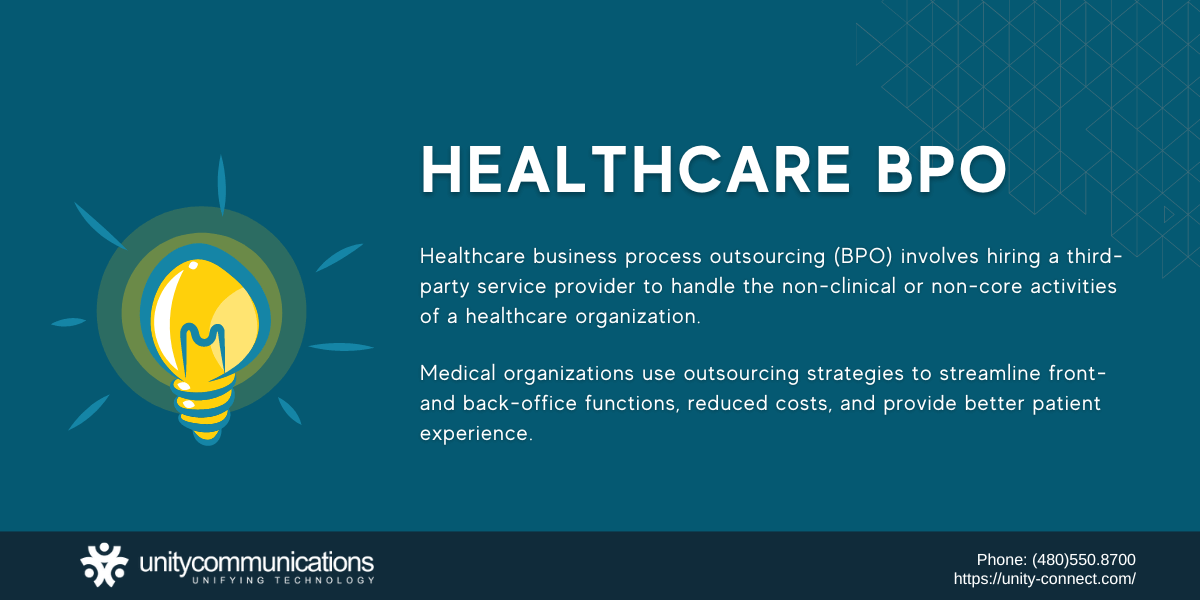Written by Joyce Ann Danieles
Contents
Business process outsourcing (BPO) is the go-to solution for many enterprises seeking cost-efficient front- and back-office support. The business practice allows them to work confidently on their priorities while saving costs on non-core functions.
Specifically, healthcare BPO helps medical providers deliver a superb patient experience while streamlining their administrative tasks. But a great relationship between a healthcare organization and its healthcare BPO provider requires clarity, transparency, and attention to detail.
This article helps you set realistic expectations by detailing the pros and cons of outsourcing in healthcare. It also provides critical insights for developing a well-structured BPO investment plan.
What Is Healthcare BPO?

Healthcare BPO refers to the practice of contracting third-party service providers to handle non-clinical tasks. Medical organizations rely on BPO firms to streamline their tedious front- and back-office functions. Each year, the promise of reduced costs attracts more healthcare businesses to outsource services, such as:
- Data Entry. Encoding data into word processing software for easy management.
- Medical Billing. Sorting medical expenses, sending invoices, and collecting payments.
- Medical Transcription. Transcribing clinical observation voice recordings.
- Claims Processing. Evaluating and verifying medical claims and applications.
- Medical Coding. Translating medical records into universal codes for accuracy.
- Customer Service. Addressing inquiries, appointments, and requests from patients.
The healthcare BPO industry is continuing to grow as more medical organizations take advantage of outsourcing. According to a report from Precedence Research, the sector’s global market value reached $334.15 billion in 2021.
The research firm reveals that the market is likely to expand at a 9.5% compound annual growth rate (CAGR), reaching almost $756 billion by 2030. Cost savings and improved patient care are driving this market expansion. But data security and transparency risks can hinder growth.
To ensure maximum returns on your outsourcing investment, you must understand how the BPO industry helps medical providers deliver unmatched services.
Let’s walk through the pros and cons of outsourcing in healthcare below.
Benefits of Healthcare Outsourcing

The healthcare industry constantly evolves, so patient needs and demands also change. This became especially obvious when the pandemic hit a few years ago. Due to restrictions and health protocols, medical providers encountered massive online requests for patient care. The number of patients going in and out of hospitals also tripled.
As a result of the overburdening of the US healthcare system, in-house medical staff struggles to this day to manage their primary and non-core tasks simultaneously. The extra pressure has led to burnout, overwork, and poor performance. As a result, more and more healthcare businesses are hiring third-party companies to ease such problems.
Medical institutions can delegate their non-clinical processes to contractors so that their teams can focus on providing excellent patient care. But before choosing the right BPO partner, they must know the pros and cons of outsourcing in healthcare.
Learning more about the following advantages of healthcare BPO is a good start.
1. Cost Reduction
Setting up an independent unit to handle front- and back-office functions requires considerable funding from healthcare organizations. They need separate capital for labor, infrastructure, and real estate expenses. To establish a well-rounded non-clinical department, they must:
- Produce creative promotional materials and launch interactive recruitment campaigns
- Collect, sort, and screen skilled applicants
- Interview potential candidates for vacant administration positions
- Prepare contracts and compensation offers
- Hire and onboard selected applicants
- Host frequent training sessions and workshops
- Provide incentives to recognize and retain employees with excellent work performance
And to ensure a productive administrative team, healthcare organizations need advanced software, modern workstations, and high-speed internet connections. Comfortable office space, recreational spots, clean restrooms, and easily accessible pantries are also necessary to empower workers.
However, these resources are costly. Investing huge amounts of money in non-core functions is unrealistic and does not ensure returns. The capital you will need for such an endeavor is better spent enhancing healthcare services.
Instead, medical providers team up with BPO companies to manage specific back- or front-office functions. Outsourcing firms already employ highly trained workers and use up-to-date systems to accomplish tasks quickly and efficiently. They also have their own workplaces. Some companies even fully implement remote work arrangements.
Healthcare organizations can pay such vendors through fixed monthly billing as part of their long-term service agreement. They can also pay for services after project completion. These choices enable them to reduce operating expenses and avoid unnecessary costs.
2. Advanced Technology Optimization
Technology contributes to the pros and cons of outsourcing in healthcare. But before tackling the drawbacks of technology, knowing how solutions from BPO companies benefit medical providers is crucial.
The global health crisis and pressing medical issues boosted the demand for better healthcare delivery. Annually, millions of people contract infectious diseases and common illnesses, and these medical backlogs overwhelm in-house teams. These challenges can prevent teams from providing outstanding patient care.
Healthcare businesses deploy advanced technologies to ease heavy workloads. They use digital platforms to accomplish repetitive tasks quickly and accurately. But fielding, managing, and maintaining the following equipment demands significant funding, time, and effort.
- Artificial intelligence (AI)-powered solutions
- Computer systems or laptops
- High-speed internet connections
- Business applications
- Smart devices
- System updates
Outsourcing allows medical institutions to optimize these technologies without overspending. The solutions BPO companies have available help healthcare organization employees complete time-consuming processes with ease. They use or provide the following digital tools to let their clients focus on their primary initiatives.
- Cloud contact center software for personalized omnichannel customer service
- AI technology for process automation
- Electronic health record systems for more efficient patient data monitoring
- Online patient portals for patients’ seamless medical record and health management
- Secure software for data entry, medical billing, transcriptions, and coding functions
3. Access to a Skilled Workforce
When discussing the pros and cons of outsourcing in healthcare, a skilled workforce is another crucial factor companies consider. Although back- and front-office functions do not directly contribute to healthcare organization revenues, they’re still critical. Medical providers need a well-trained, non-core team to ensure smooth operations.
But getting the best talent demands money and effort. The demands of hiring and training can prevent healthcare businesses from working on their primary initiatives.
Healthcare BPO services do not require a rigorous talent search. Third-party service providers already have skilled contractors capable of accomplishing non-clinical tasks effectively.
BPO firms ensure competence by conducting regular employee training and upskilling programs. Most importantly, they provide the right compensation to ensure outstanding employee performance.
4. Scalability and Productivity Enhancement
A BPO provider supplies healthcare businesses with the workforce and technology required to increase productivity. Third-party workers are highly skilled as they undergo regular training and certification. They are experts in the field and perform their tasks efficiently.
BPO’s advanced solutions streamline and automate repetitive assignments. Speed and accuracy are thus additional benefits of acquiring outsourced healthcare services.
Furthermore, contractors assist medical providers in scaling their operations. They adapt their services according to the changing needs of the healthcare business. Medical BPO services are payable through monthly billing or on a pay-as-you-need setup.
Vendors can also make necessary adjustments to meet patient demands, healthcare goals, and industry expectations. They constantly modify their operational strategies to ensure smooth task execution in line with their client’s policies and procedures.
5. Patient Care Improvement
Core services, such as checkups, diagnoses, and treatment, directly contribute to business growth. They help measure revenue, patient trust, and reputation.
But because of the heavy load of administrative tasks, medical providers might struggle to focus on improving their patient care services. Assigning back- and front-office functions to the same in-house employees only results in overwork and burnout.
Working with BPO contractors allows healthcare businesses to prioritize patient care. Such vendors are experts in this field, knowing the ins and outs of industry strategies and standards. Hence, medical providers can trust them to independently organize and manage administrative tasks.
Drawbacks of Healthcare Outsourcing

Despite the many advantages of healthcare BPO, medical organizations might experience certain inconveniences while outsourcing non-clinical functions. So identifying and understanding the drawbacks beforehand is essential. This helps you develop a concrete plan to address future challenges appropriately.
To fully understand the pros and cons of outsourcing in healthcare, here are the disadvantages of contracting a BPO provider.
1. Limited Quality Control
Medical organizations lack quality control when working with third-party service providers. It is hard for healthcare businesses to track the BPO partner’s every move due to their priorities and business goals.
Contractors specialize in handling back- and front-office functions. But medical providers still need to establish a good connection with their BPO partners to ensure high-quality work. Otherwise, the resulting gap can lead to poor services and dissatisfied patients.
2. Overlooked Hidden Fees
Healthcare BPO companies offer fixed and variable service fees. Medical organizations pay for their services via monthly billing cycles or a pay-as-you-need setup. However, they might pay more than their agreed amount if they overlook hidden costs. Currency conversions and value fluctuations are extra charges to look out for, especially when hiring an offshore provider.
3. Data Security Risks
According to the HIPAA Journal, 692 large healthcare data breaches were reported from July 2021 to June 2022, with over 42 million patient records exposed. Ransomware attacks, hacking incidents, and unauthorized data access were the cause of these breaches.
The figures show how vulnerable medical data and records are to cyberattacks, especially when partnering with third-party companies. Although contractors adhere to strict security policies and procedures, they remain susceptible to malicious activities.
Medical institutions face hacking risks and privacy issues if they do not work closely with their providers. Such problems, if left unaddressed, lead to expensive threat mitigation efforts.
4. Transparency Issues
Hiring a BPO provider involves sharing confidential data. But some providers might hesitate and withhold relevant information via their security software solutions. Likewise, some healthcare businesses are reluctant to exchange insights.
This lack of transparency weakens trust between the healthcare BPO provider and the healthcare organization. The parties cannot identify and resolve problems efficiently because they do not know each other’s working strategies. Such gaps further complicate issues, resulting in revenue losses and high mitigation costs.
5. Technology Flaws
Although modern technologies help streamline tedious non-core tasks, problems can still arise. If BPO companies are not keen to monitor and maintain their platforms, technical issues will only add to the in-house team’s burdens. Their client medical organizations can also suffer from the high cost of project delays and mitigation expenses.
The Bottom Line
Healthcare BPO serves as the one-stop-hub for many medical providers looking for affordable back-office and front-office support services. The business practice lets them focus on enhancing patient care while reducing costs on non-core functions. But drawbacks still impede enterprises from taking full advantage of outsourcing.
So make sure you understand the pros and cons of outsourcing in healthcare beforehand to help you develop a concrete BPO investment plan. This approach guarantees returns and prepares your team for any challenges in the future.
Do you want to collaborate with the best healthcare BPO provider? Contact Unity Communications now. The award-winning provider delivers robust solutions to streamline your labor-intensive administrative tasks and help boost the patient experience.



